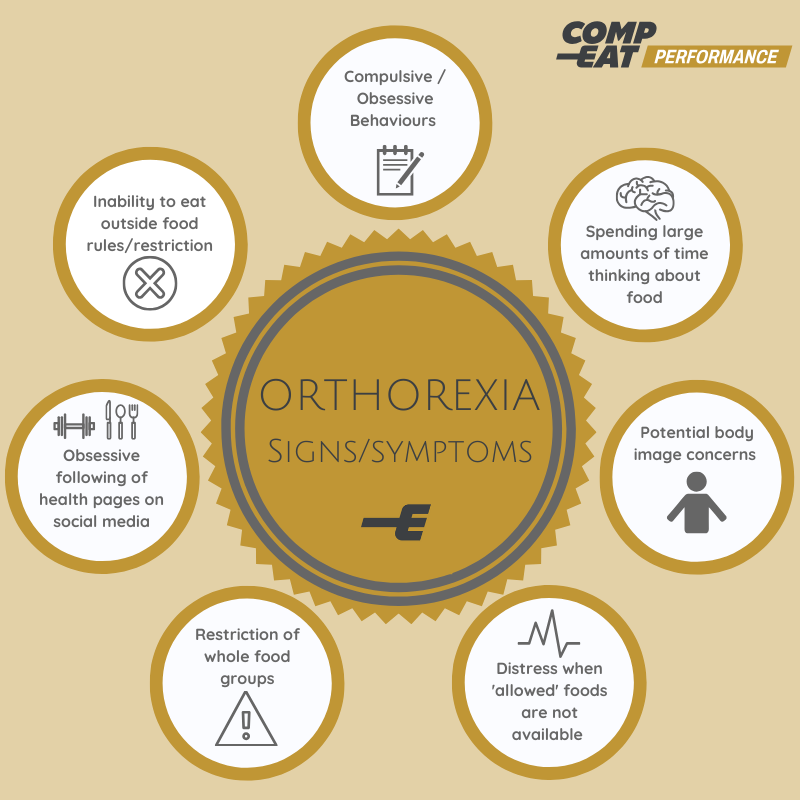
The term orthorexia is gaining more attention, particularly conversations about obsessive healthy eating (or disordered eating) – yet it remains unfamiliar or misunderstood by many.
As social media plays a bigger role in our lives, especially for younger generations, the pressure around “clean eating” and “healthy eating” has grown. Scrolling through, you’re often faced with perfectly styled meals, fancy ingredients, and a feeling that “simple” eating is no longer enough.
Food has become more complicated and confusing than ever. The pressure to follow the “right” eating trends from influencers can be overwhelming. Often, these food “rules” leave no room for balance – you either belong to a certain group, like clean eating, vegan, paleo, HFLC, or IIFYM, or you don’t.
It’s important to note that following a specific eating style or being mindful of healthy eating isn’t the same as Orthorexia. You can absolutely eat healthily and with balance without it taking over your life.
But for some, the pressure to restrict can lead to confusion, fear of food, and disordered eating patterns.
So what is Orthorexia?
Orthorexia Nervosa, or Orthorexia, is quite literally an obsession with ‘healthy eating’ (i.e. eating foods that the individual deems as healthy).
Orthorexia is not officially recognised as an eating disorder but shares behavioural and physical similarities with anorexia. Both involve food restriction, but orthorexia centres on an obsession with healthy eating rather than weight loss.
It is the belief that each day is about being ‘good’ with intake. It begins with the desire to improve food and eat healthily, but this focus on healthy eating can sometimes change into an obsession so restrictive that health, relationships and social life can all be impacted.
What Contributes to the Obsession with Healthy Eating?
This is a really complicated question and not something we can accurately predict. Some individuals are simply more prone to developing disordered eating patterns due to genetics, family history and mental health.
Orthorexia often stems from a need for control and a sense of achievement through restrictive eating. People with low self-esteem, those facing significant pressure or chaos in their lives, or individuals with obsessive tendencies may be more at risk.
Signs & Symptoms

- Restricting entire food groups and defining yourself by these limits
- Obsessively checking ingredient lists or tracking every meal and snack
- Struggling to eat anything outside your set “rules” and only choosing foods you see as healthy
- Spending a lot of time thinking about food, especially around social events or situations you can’t control
- Feeling anxious or distressed when healthy foods aren’t available
- Following social media pages that push strict “healthy eating” lifestyles
- Experiencing body image concerns and punishing yourself over food choices
Where to Seek Help
Although Orthorexia isn’t a clinical diagnosis yet, recovery usually needs support. The best way to prevent it from worsening is to seek help early.
Step One: Recognising the need for help is a crucial first step in recovery.
Step Two: Start with your GP, especially if they have experience with eating disorders. If you’re not ready for that yet, the National Eating Disorders Collaboration (NEDC) offers helplines and support—visit their website for more details: http://www.nedc.com.au/helplines
Step Three: Recovery involves different approaches and may include working with various professionals to address the reasons behind your food restrictions.
Recovery doesn’t mean eating all the foods you once avoided or eating in a way that feels ‘unhealthy.’ Instead, it’s about finding a healthy relationship with food, allowing more flexibility while nourishing your body.
Take Home Message
Knowledge is power, and we hope that by highlighting this sensitive issue we can create some awareness and in turn bring about some really beneficial discussion. If you yourself have been feeling some of these symptoms, sometimes it can make all the difference in being able to have a name for it and a plan of action for the next step to treatment.
Health trends and diets will continue to appear and continue to be taken to the extreme, and the disordered eating patterns that ensue should never be overlooked as a ‘phase’. They are not normal and they should never be accepted as normal.
Asking for help is nothing to be ashamed of – we all deserve to enjoy one of life’s greatest pleasures: food! Food is more than just nutrients or calories. It’s about nourishment, connection, enjoyment, and creating memories. You can have a balanced, healthy relationship with food without it taking over your life.
Cowritten by:
Aleisha Deane (Accredited Practising Dietitian) and Alicia Edge (Accredited Practising Dietitian & Advanced Sports Dietitian)
Need More Support?
You can contact our customer service team here for more information regarding dietetic support options, or access a free wellbeing profile below!


